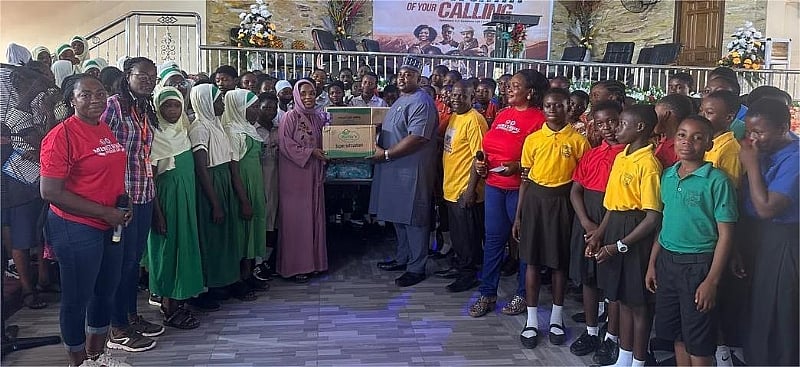The Ayawaso North Municipal Assembly, in partnership with the Ayawaso North Municipal Education Directorate, marked Menstrual Hygiene Day 2024 with a comprehensive outreach program aimed at promoting menstrual health and hygiene among school-aged children within the municipality. The event, held on May 28th, involved the distribution of 700 sanitary pads to 17 schools and incorporated educational sessions designed to break the silence and stigma often associated with menstruation. This initiative underscores the growing recognition of menstrual hygiene as a critical aspect of public health and the importance of community engagement in fostering a supportive and inclusive environment for menstruating individuals, particularly young girls. By targeting schools and involving both male and female students, the program sought to normalize conversations around menstruation and encourage open dialogue within families and communities.
The commemoration emphasized the collective responsibility in creating a period-friendly society. Mr. Emmanuel Kofi Techie, the Municipal Director of Education, highlighted the importance of involving both boys and girls in these conversations, stressing the crucial role males play in dismantling harmful taboos. His message resonated with the overarching theme of Menstrual Hygiene Day, which emphasizes the need to shift societal perceptions and normalize menstruation as a natural biological process. By engaging boys as allies, the program aims to cultivate a culture of understanding and support, dismantling the secrecy and shame that often surrounds menstruation. This inclusive approach is vital in creating a more equitable and informed society where menstruation is not a barrier to education or full participation in social life.
Mr. Mohammed Awal Haruna, the Municipal Chief Executive, reinforced the importance of maintaining proper hygiene practices during menstruation. He emphasized the practical aspects of menstrual hygiene management, including proper disposal of sanitary pads, and encouraged students to prioritize their health and well-being. His message extended beyond the practicalities of hygiene to encompass safety and well-being, urging students to report any instances of threat or discomfort to trusted adults. This comprehensive approach highlights the interconnectedness of physical health, psychological well-being, and safety, particularly for young girls navigating the challenges of puberty and menstruation.
The program also addressed broader social issues relevant to adolescent health and development. Madam Rosemond A. Opoku, Senior Social Development Officer, cautioned students about the risks associated with early relationships and teenage pregnancy. Her message underscored the importance of focusing on education and making responsible choices, emphasizing the link between education and a brighter future. By connecting menstrual health with broader life goals, the program empowered young girls to make informed decisions and prioritize their education, recognizing it as a pathway to personal growth and empowerment.
The distribution of sanitary pads to beneficiary schools represents a tangible effort to address the practical needs of menstruating girls. Access to sanitary products is a crucial component of menstrual hygiene management, ensuring that girls can manage their periods with dignity and confidence. The provision of these essential supplies removes a significant barrier to education, as the lack of access to sanitary pads can lead to absenteeism and reduced participation in school activities. By addressing this practical need, the program directly contributes to the educational attainment and overall well-being of young girls in the municipality.
The practical demonstration on how to properly wear a sanitary pad further reinforced the educational component of the program. This hands-on approach ensured that girls received clear and accurate information on how to effectively use the provided supplies. By combining practical instruction with broader discussions about menstrual health and hygiene, the program promoted a holistic understanding of menstruation and empowered girls to manage their periods with confidence. The theme “Together for a Period-Friendly Ghana” encapsulates the collaborative spirit of the event, emphasizing the collective responsibility in creating a society where menstruation is understood, accepted, and supported. The outreach program serves as a model for future initiatives aimed at promoting menstrual health and hygiene across Ghana, highlighting the importance of education, access to resources, and open dialogue in breaking down stigma and empowering young girls.














